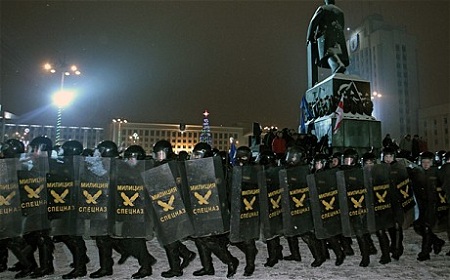Surprising no one, allies of Belarussian strongman Alexander Lukashenko have won all 110 seats in the House of Representatives of Belarus (Палата Представителей in Russian, Палата Прадстаўнікоў in Belarusian) after major opposition parties boycotted elections on Sunday in a system that has been essentially a dictatorship for nearly two decades.![]()
Lukashenko (pictured above voting on Sunday) came to power only in 1994 in Belarus, well after the collapse of the Soviet Union — ironically, the one-time director of a state-run farm was elected president on the strength of his anti-corruption reputation. By 1996, constitutional reforms had transformed Lukashenko into a dictator, and he was subsequently reelected in 2001, 2006 and 2010.
Sunday’s election was not expected to change that in the country that generally has the least amount of personal freedom in Europe and the greatest amount of human rights violations — the photo above shows the police response in Minsk, the Belarusian capital, to protestors leading up to the unfair and unfree 2010 presidential election, and there’s obvious signs of worry from Lukashenko that protests could follow Sunday’s vote as well.
The 2012 parliamentary elections have already been panned by the Organisation for Security and Cooperation in Europe:
“This election was not competitive from the start,” Matteo Mecacci, an OSCE coordinator, said in the statement. “A free election depends on people being free to speak, organize and run for office, and we didn’t see that in this campaign.”
German foreign minister Guido Westerwelle, who has attacked Lukashenko’s human rights record in the past (Lukashenko, in a dig at the openly gay Westerwelle, responded earlier this year that it was better to be a dictator than gay), declared that the vote indicates that “Belarus is the last dictatorship in the heart of Europe.”
Lukashenko joins just three other post-Soviet leaders who have ruled their respective former Soviet republics with an iron fist since the breakup of the Soviet Union in 1991 (or very shortly thereafter): Uzbekistan’s Islam Karimov, Kazakhstan’s Nursultan Nazarbayev (who was reelected last year with 95.5% of the vote!) and Tajikistan’s Emomalii Rahmon, who came to power in 1992.
While all of those leaders rule in central Asia, however, Lukashenko rules a country in the center of Eastern Europe with around 9.5 million people, a country that borders Poland, Ukraine, Lithuania and Latvia, each current or aspiring European Union members.
Lukashenko, ‘the last European dictator,’ however, has cultivated perhaps the closest relationship with Russia of any of the former Soviet republics — and Belarus serves as a transit for Russian oil and gas to the rest of Europe. Lukashenko’s coziness with the Putin regime in Russia has prompted some discussion last decade that Belarus might even one day join into a more formal union with Russia.
The two leading opposition parties in Belarus — both of which are mainstream center-right, pro-democracy and anti-Lukashenko parties and both of which are observer members of the European People’s Party in the European Parliament, boycotted the election just last week after it became clear they would have no chance to win any support:
- The Партыя БНФ (the BPF Party, formerly the Belarusian Popular Front ‘Revival’ until 2005, when Lukashenko decreed that the words ‘Belarusian,’ ‘National,’ ‘Popular,’ and ‘People’s’ could not be used in the names of any parties or other political movements) was formed in 1988 to promote Belarusian independence and, since independence, greater democracy and a greater nationalist rebirth of Belarusian identity. One of its leaders, Aliaksandr Milinkevič, served as the consensus opposition candidate for president in 2006 against Lukashenko, winning support from European leaders, but just 6.2% of the rigged vote (the 2010 presidential election was even more skewed in favor of Lukashenko).
- The Объединенная гражданская партия (United Civil Party of Belarus, Аб’яднáная грамадзянская пáртыя Беларýсі in Belarusian) was formed in 1995, a merger of the United Democratic Party and the Civil Party as an opponent to Lukashenko’s growing threat to Belarusian democracy.
The country’s $5,881 nominal GDP per capita (in 2011) is akin to the economic development of Serbia (GDP per capita of $6,080) despite a Soviet-style, state-run economy that, in any event, remains highly dependent on a strong Russian market and despite several troubling economic signs: a 2010 financial crisis that stemmed from efforts by the Lukashenko regime to raise wages in advance of his reelection, thereby causing inflation and a balance of payments crisis, and the looming repayment of a $3.5 billion loan from the International Monetary Fund in 2009. Continue reading Surprise! Lukashenko allies win rout in rigged, boycotted Belarus elections

